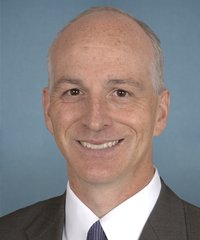
Adam Smith was born on June 15, 1965, in Washington, D.C. Adam was raised in SeaTac, Washington where his father, Ben, worked as a ramp serviceman at SeaTac Airport and was active in the local Machinists’ Union. His mother, Leila, stayed at home, raising Adam and his two brothers. Adam attended Bow Lake Elementary, Chinook Middle School, and Tyee High School, graduating from Tyee in 1983.
After a year at Western Washington University, Adam transferred to Fordham University, where he worked his way through college loading trucks for United Parcel Service and graduated in 1987 with a degree in Political Science. Following his graduation, Adam attended the University Of Washington School Of Law, and earned his law degree in 1990. He later worked in both private and public practice, first as a lawyer at Cromwell, Mendoza and Belur in 1992, and then as a prosecutor for the City of Seattle from 1993-1995. As a prosecutor, Adam focused on drunk driving and domestic violence cases, and in 1996, went on to work as a judge pro tempore.
The rights and freedoms of citizens need to be protected. When the fundamental rights of life, liberty, and equal opportunity are unfairly denied to a person or a group of people, it is the role of the federal government to step in and fulfill the promise of America.
We must continue to work on creating a welcoming community and country for all while ensuring everyone has the opportunity to succeed; discrimination in any form cannot be tolerated. Across the United States we have seen increasing acts of hate against people of different ethnic, religious, and cultural backgrounds and sexual orientations. This is unacceptable. While individuals have the right to express their thoughts and beliefs, bigotry and hate are deplorable and we must be clear that it will not be tolerated. I have worked to oppose discrimination on multiple fronts while also supporting policies that seek to address some of the effects of institutionalized racism and inequality.
Voting Rights
Since its passage in 1965, the Voting Rights Act (VRA) has served as a benchmark to ensure all Americans’ voices are heard at the ballot box. But on June 25, 2013, the Supreme Court invalidated Section Four of the VRA, a provision that protects voting rights in nine states that historically have had discriminatory voting practices. The Supreme Court found that Section Four had an outdated formula that placed undue and outdated federal burden on the nine states.
I was very disappointed in the Supreme Court’s ruling. By striking Section Four, the Supreme Court limited the federal government’s ability to implement Section Five, consequently rendering this section of the VRA powerless and threatening the right to vote for many Americans. Any state can now implement Voter ID laws and redraw district lines to dilute the voices of large populations of mainly racial and ethnic minorities without federal oversight. In the 2012 election, low income voters and people of color, mainly African American and Latino voters, waited in line to vote twice as long as white voters. Additionally, many local and state laws and policies were put into effect subjecting low-income Americans, especially those of color, to undue electoral burden.
Since first coming to Congress, I have been a strong advocate for voting rights, and remain committed to doing all I can to ensure that no voter experiences discrimination. We need elections where the issues are what matter and campaigns compete on the quality of their ideas. I have taken numerous efforts to protect and expand upon voting rights at the federal level.